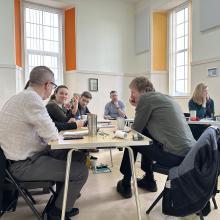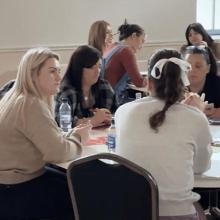Introduction
Recently we were invited back to North Ayrshire to meet some Newly Qualified Social Workers (NQSWs) and talk about practitioner research. This was a follow up to a session we ran in 2023 where we discussed benefits, challenges and ideas around research in practice. North Ayrshire HSPC has a Learning and Development Strategy that puts evidence-informed practice and practitioner research at its core and Iriss has offered some hands-on support.
Picture this
In this session we covered the key concepts - what is practitioner research in social services and why does it matter? We started by asking the group to choose a picture postcard that represented how they felt about research. We noticed again how using images helped support a rich discussion about their experience of research, their worries and hopes. Much of their research experience was around writing dissertations and assignments for university and we discussed the shift to research in practice.
Motivation
We wanted to make practitioner research closely related to practice, not a bolted-on activity. To do this, we connected with the groups’ motivation and day to day experience. We asked them to work in small groups to think about things they’re noticing in practice that they’d like to change or know more about. What improvements would they like to see and who would benefit? One of the practice teachers in the group shared an example of research she led that produced a practical tool to support an area of practice. This showed that practitioner research can be small scale, done quickly and have an impact on practice.
Using this example as a springboard, the group had no trouble coming up with ideas of things they wanted to improve and were clear on the benefits for children and families. We explored the idea that practitioner research can be around evaluating a change that you have already made, and how it is working in practice. There was a suggestion that recently improved family rooms could be evaluated to understand the impact this has had on children and parents, and the time they spend together. Again, this demonstrates that practitioner research can be closely linked to practice, and it doesn't need to be something onerous, that moves practitioners away from important, every-day delivery.
Challenges
From the initial discussion and the previous session, we were aware that the idea of undertaking research within the first 18 months of practice (as per the L&D strategy) was overwhelming for some. NQSWs described the challenges of carrying a caseload and meeting the requirements of the supported year, a few referring to this additional work as ‘the fifth year of university’. Some described using their flexi-time and days off to complete the work when protected time wasn’t enough. This led to a research idea about exploring the impact of the supported year on NQSWs. Given this context, we tried to make the idea of practitioner research as manageable as possible. What small changes could they try? How could they collaborate and use peer support? How can they involve supported people?
Small changes matter
By the end of the session, the group had developed some research ideas to take forward together and we felt they had moved from overwhelm to excitement. This is an important shift in doing things differently in a system that is time and resource poor. Research can be daunting but small changes matter and practitioners are uniquely placed to see what needs to improve and to work with those they support to do things better.



